CET4作文类型一议论文(对比或选择观点分析)
- 格式:doc
- 大小:94.50 KB
- 文档页数:71
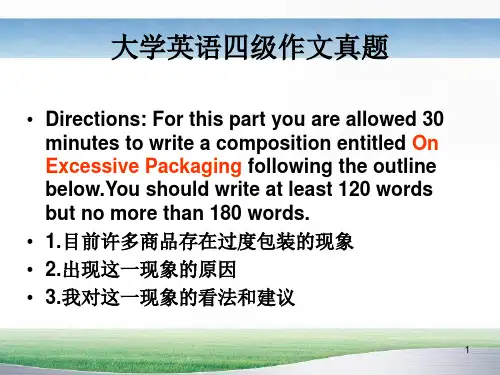

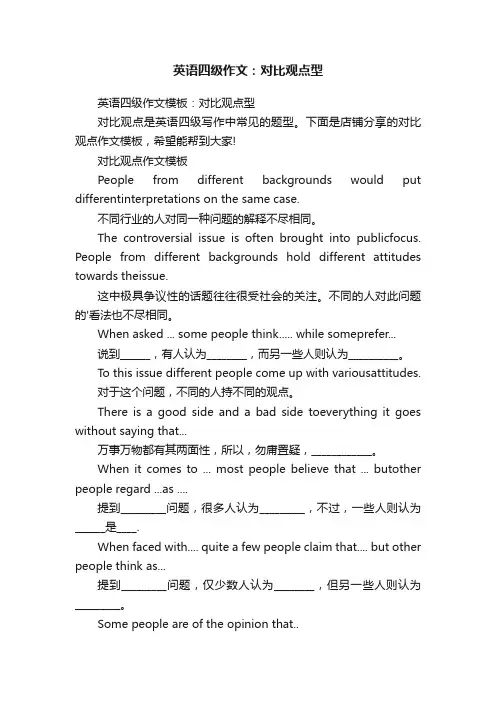
英语四级作文:对比观点型英语四级作文模板:对比观点型对比观点是英语四级写作中常见的题型。
下面是店铺分享的对比观点作文模板,希望能帮到大家!对比观点作文模板People from different backgrounds would put differentinterpretations on the same case.不同行业的人对同一种问题的解释不尽相同。
The controversial issue is often brought into publicfocus. People from different backgrounds hold different attitudes towards theissue.这中极具争议性的话题往往很受社会的关注。
不同的人对此问题的'看法也不尽相同。
When asked ... some people think..... while someprefer...说到______,有人认为________,而另一些人则认为__________。
To this issue different people come up with variousattitudes.对于这个问题,不同的人持不同的观点。
There is a good side and a bad side toeverything it goes without saying that...万事万物都有其两面性,所以,勿庸置疑,____________。
When it comes to ... most people believe that ... butother people regard ...as ....提到_________问题,很多人认为_________,不过,一些人则认为______是____.When faced with.... quite a few people claim that.... but other people think as...提到_________问题,仅少数人认为________,但另一些人则认为_________。
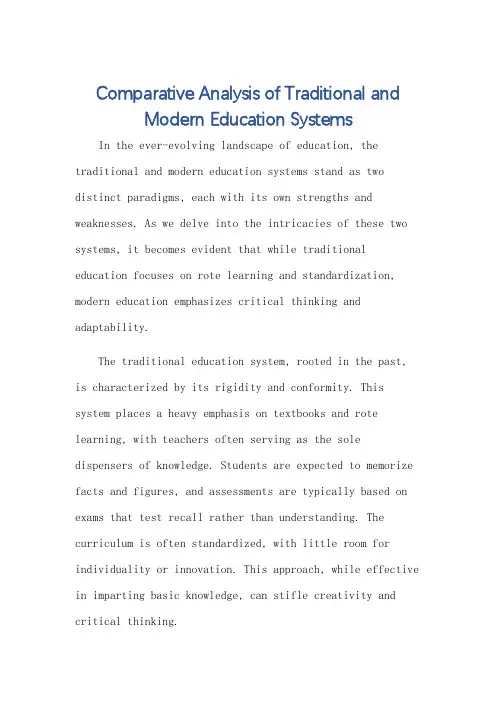
Comparative Analysis of Traditional andModern Education SystemsIn the ever-evolving landscape of education, the traditional and modern education systems stand as two distinct paradigms, each with its own strengths and weaknesses. As we delve into the intricacies of these two systems, it becomes evident that while traditional education focuses on rote learning and standardization, modern education emphasizes critical thinking and adaptability.The traditional education system, rooted in the past, is characterized by its rigidity and conformity. This system places a heavy emphasis on textbooks and rote learning, with teachers often serving as the sole dispensers of knowledge. Students are expected to memorize facts and figures, and assessments are typically based on exams that test recall rather than understanding. The curriculum is often standardized, with little room for individuality or innovation. This approach, while effective in imparting basic knowledge, can stifle creativity and critical thinking.On the other hand, the modern education system aims to cultivate a more comprehensive and adaptive skill set among students. It emphasizes hands-on learning and critical thinking, encouraging students to question, explore, and innovate. Teachers serve as facilitators, guiding students towards independent discovery and understanding. The curriculum is more flexible, allowing for the integration of new technologies and innovative teaching methods. Assessments are typically more diverse, including projects, presentations, and other forms of active learning. This approach fosters a more dynamic and inclusive learning environment, where students are encouraged to think outside the box and apply their knowledge to real-world problems. However, it is important to note that while the modern education system has its advantages, it also faces its own challenges. The integration of new technologies and innovative teaching methods can require significant investment in infrastructure and teacher training. Additionally, the focus on hands-on learning and critical thinking can sometimes lead to a lack of basic knowledge and skills. Therefore, a balanced approach that combinesthe best of both systems is perhaps the most ideal way forward.In conclusion, the traditional and modern education systems each have their own strengths and weaknesses. While the traditional system excels in imparting basic knowledge through rote learning and standardization, it can stifle creativity and critical thinking. The modern system, on the other hand, fosters a more comprehensive and adaptive skill set by emphasizing hands-on learning, critical thinking, and innovation. However, it also faces challenges related to infrastructure investment and teacher training. Therefore, a balanced approach that combines the best of both systems is perhaps the most effective way to prepare students for the complexities of the 21st century.**传统教育与现代教育的对比分析**在教育这一不断演变的领域中,传统教育和现代教育体系是两种截然不同的范式,各自具有其优势和局限性。
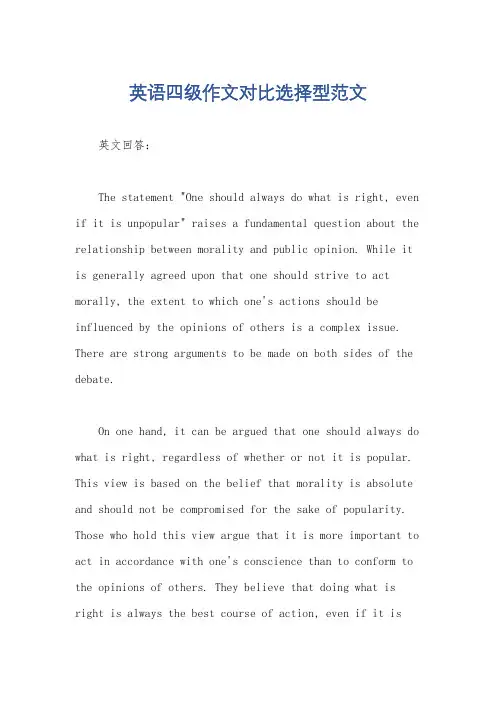
英语四级作文对比选择型范文英文回答:The statement "One should always do what is right, even if it is unpopular" raises a fundamental question about the relationship between morality and public opinion. While it is generally agreed upon that one should strive to act morally, the extent to which one's actions should be influenced by the opinions of others is a complex issue. There are strong arguments to be made on both sides of the debate.On one hand, it can be argued that one should always do what is right, regardless of whether or not it is popular. This view is based on the belief that morality is absolute and should not be compromised for the sake of popularity. Those who hold this view argue that it is more important to act in accordance with one's conscience than to conform to the opinions of others. They believe that doing what is right is always the best course of action, even if it isdifficult or unpopular.On the other hand, it can also be argued that one should sometimes consider the opinions of others when making moral decisions. This view is based on the belief that morality is not always absolute and that there may be times when it is necessary to compromise in order to avoid causing harm. Those who hold this view argue that it is important to balance the desire to do what is right with the need to consider the consequences of one's actions. They believe that it is sometimes better to do what is popular, even if it is not strictly moral, in order to avoid causing unnecessary conflict or harm.Ultimately, the decision of whether or not to do what is right, even if it is unpopular, is a personal one. There is no easy answer, and the best course of action will vary depending on the specific circumstances. However, it is important to consider both sides of the debate before making a decision.中文回答:观点一:应该始终做正确的事,即使不受欢迎。
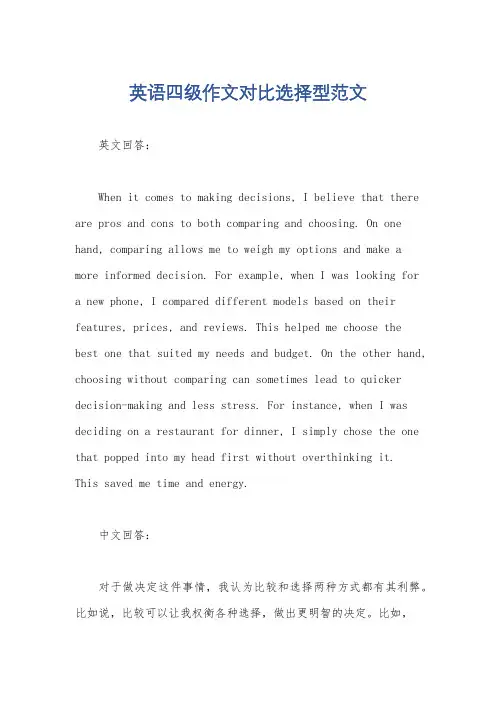
英语四级作文对比选择型范文英文回答:When it comes to making decisions, I believe that there are pros and cons to both comparing and choosing. On one hand, comparing allows me to weigh my options and make a more informed decision. For example, when I was looking for a new phone, I compared different models based on their features, prices, and reviews. This helped me choose the best one that suited my needs and budget. On the other hand, choosing without comparing can sometimes lead to quicker decision-making and less stress. For instance, when I was deciding on a restaurant for dinner, I simply chose the one that popped into my head first without overthinking it.This saved me time and energy.中文回答:对于做决定这件事情,我认为比较和选择两种方式都有其利弊。
比如说,比较可以让我权衡各种选择,做出更明智的决定。
比如,当我在找新手机的时候,我根据功能、价格和评价比较了不同型号,这帮助我选择了最适合我的需求和预算的手机。
另一方面,不经过比较直接选择有时候可以更快速地做出决定,减少压力。

四级作文对观点模板篇一《网购的利与弊》网购现在可太流行了,就像一阵风一样吹进千家万户。
我自己就有一次特别深刻的网购经历。
那次我想买一双运动鞋,在商场里逛了好几家店都没看到特别满意的。
要么就是款式喜欢但尺码不对,要么就是价格太贵。
回到家我就打开了网购平台。
哇,那一排排的运动鞋,各种各样的款式、颜色和尺码,眼睛都看花了。
我很轻松地就按照自己的喜好进行筛选,很快就找到了一双外观超酷且价格便宜不少的鞋子。
下单之后,我就开始满心期待地等我的鞋。
不过也有点小担心,就怕收到的鞋子跟图片有很大差距或者质量不好。
就拿说这网购的好处吧,真的太多了。
首先就是方便啊,不用像在商场里逛街逛到腿软。
而且选择超级多,天南地北的商品都能买到。
还有价格有时候就比实体店便宜好多。
再比如说一些小地方的东西,在本地可能买不到,但网购就可以轻松搞定。
可这网购也有它的弊端。
在我等那双鞋子的期间啊,我每天都在看物流信息,那种等待的感觉挺煎熬的。
而且收到东西万一不合适或者有问题,退换货有时候就比较麻烦。
像我朋友网购了一件衣服,收到发现有个小口子,想退换货,结果卖家和快递之间来回扯皮,搞得我朋友很是心烦。
所以说网购虽然方便,但也不是十全十美。
就像我买鞋这次,收到鞋以后发现有点味道,不过还好不是什么大问题,我自己处理处理也就算了。
总之呢,网购是个有好有坏的事情,大家在网购的时候要权衡一下利弊,既要享受它的方便与实惠,也要能接受可能会出现的一些小麻烦。
篇二《养宠物的欢乐与烦恼》我一朋友是个超级爱动物的人,他养了只小狗。
这养宠物啊,真的就像开盲盒,有惊喜也有烦恼。
他这狗是从救助站领养的小串串。
刚开始带回家的时候,那小狗特别胆小,缩在角落里不敢动。
朋友就一点一点靠近它,耐心地拿吃的引诱它,慢慢接触之后,小狗和他亲得不得了。
看小狗一天天变得活泼开朗,就像看着自己的孩子在茁壮成长一样。
那狗还特别聪明,能听懂一些指令,朋友说“坐”,它就乖乖坐好,眼睛亮晶晶地看着朋友,就等着奖励呢。
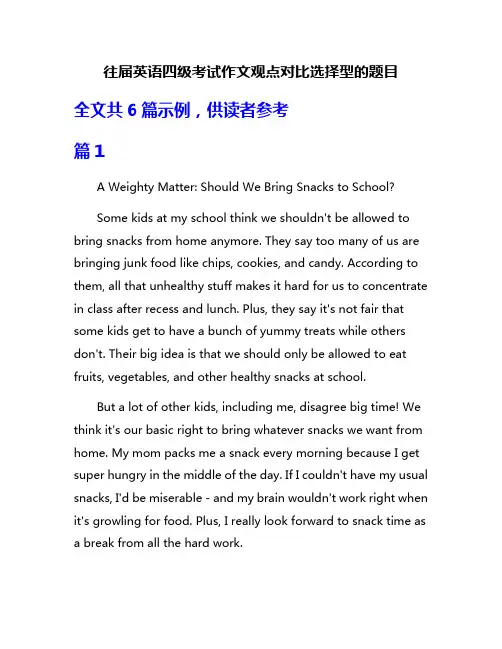
往届英语四级考试作文观点对比选择型的题目全文共6篇示例,供读者参考篇1A Weighty Matter: Should We Bring Snacks to School?Some kids at my school think we shouldn't be allowed to bring snacks from home anymore. They say too many of us are bringing junk food like chips, cookies, and candy. According to them, all that unhealthy stuff makes it hard for us to concentrate in class after recess and lunch. Plus, they say it's not fair that some kids get to have a bunch of yummy treats while others don't. Their big idea is that we should only be allowed to eat fruits, vegetables, and other healthy snacks at school.But a lot of other kids, including me, disagree big time! We think it's our basic right to bring whatever snacks we want from home. My mom packs me a snack every morning because I get super hungry in the middle of the day. If I couldn't have my usual snacks, I'd be miserable - and my brain wouldn't work right when it's growling for food. Plus, I really look forward to snack time as a break from all the hard work.Those who want to ban sugary, salty, fatty snacks make some fair points. I can't argue that fruits and veggies are way better for you than potato chips. And I've definitely seen some kids go overboard and eat a huuuge bag of M&Ms for snack, which probably doesn't help them focus in class. I get why teachers would want to cut down on that.But still, those healthy food fans are going too far in my opinion. Snacks are supposed to be fun treats to look forward to, not just boring health food. If we could only have fruits and veggies, snack time wouldn't even feel special anymore. Lots of kids would probably just skip snack altogether if they couldn't have any of their favorite munchies.My idea is to compromise. At my old school, we had "healthy snack weeks" once a month where you couldn't bring any junk food. That made total sense to me because it taught us about nutrition without banning fun snacks completely. Maybe schools could also set limits, like you can only bring one small bag of chips or a few cookies along with a healthy snack.Another reason I don't want to lose my usual snacks is because they connect me to my family's culture. My grandma always includes some special Pakistani snacks that I really treasure, like jalebi or samosa. Getting to eat those treats atschool helps me feel close to my cultural roots. A total snack ban could isolate kids from their ethnic backgrounds.I also worry that getting extremely strict about snacks could promote disordered eating habits. If we start sending the message that certain foods are 100% forbidden no matter what, that could lead to sneaky habits and feeling ashamed about food. My friend Jessica has already started hiding to eat her snacks because she's self-conscious after getting teased for her "junk" snacks. That doesn't seem healthy to me at all.The bottom line is, of course we shouldn't go overboard with constant junk food. But children also shouldn't feel guilty or deprived about having fun snacks in reasonable portions. Taking away that simple joy completely could easily go too far and do more harm than good. A total snack ban seems like an overreaction that could rob us of cultural connectedness, pleasure, and balanced attitudes about food.Ultimately, I think snack time moderation is the way to go, not elimination. We're just kids - let us be kids and enjoy our snacks! With some common sense limits and lessons in moderation, we can absolutely still reap the benefits of healthy snacking habits without snack-based food shaming or a totalprohibition on our favorite munchies. Finding that balance seems much smarter to me than a total snack ban.篇2Should Kids Have Smartphones?Smartphones are really cool! All the big kids have them and they can play games, watch videos, and chat with their friends whenever they want. But some parents and teachers think kids shouldn't have smartphones until they're older. There are good points on both sides of this argument.Some people say kids should be allowed to have smartphones because it helps them learn about technology from a young age. Smartphones have lots of educational apps and games that can make learning fun. You can look up information on the internet really easily too. Having a smartphone means you can learn new things anywhere, not just at school. It's preparing kids for a world where technology is everywhere.However, others argue that smartphones are too distracting and addictive for children's developing brains. They say it's hard for kids to control themselves from playing games or watching videos all the time instead of focusing on schoolwork. Some studies even show that too much screen time can affect kids'sleep, social skills, and ability to pay attention. A lot of parents worry their kids will become hooked on their phones.Those in favor of kids having phones say it allows families to stay connected and makes sure kids are safe. If a child gets lost or there's an emergency, they can instantly call their parents. Parents can also check where their kids are. For families with two working parents, phones allow kids to easily contact them during the day. Giving kids this responsibility helps them become more independent too.On the other hand, critics point out that smartphones expose kids to dangers like cyberbullying, inappropriate content, excessive social media use, and data privacy risks. There have been tragic cases of kids being targeted by predators online. Smartphones make it easier for kids to view violent, sexual, or hateful content that can mentally scar them. And companies are constantly collecting data about kids through phone apps, which many see as unethical.Personally, I think kids should get basic phones for calling and texting parents, but not have full unmonitored access to smartphones until they're 12 or 13 years old. That way they can still be contacted for safety, but don't get exposed to the negatives of social media and addictive games too early. Parentscan start by heavily limiting and monitoring "screen time" on smartphones, and then give more freedom as the child shows responsibility.But those are just my thoughts! Every family is different. Some parents will decide their kids are mature enough to handle smartphones from a younger age. Others may prefer to wait until high school. There's no perfect one-size-fits-all solution. It's a complex issue with reasonable arguments on both sides. What do you think - should kids have unlimited access to smartphones or not? I'd be curious to hear your perspective!篇3Essay Prompt: Some people think kids should have lots of homework every night to help them learn. Others think kids have too much homework and it causes them a lot of stress. What is your opinion? Use specific reasons and examples to support your position.Response:I'm just a kid in elementary school, but I have some strong thoughts about homework! To me, having a little bit of homework is OK because it helps reinforce what we learn in class.But too much homework is super stressful and makes me feel overwhelmed.On one hand, I can see why teachers think giving homework is important. It allows us to practice the skills we're learning, like math problems, reading comprehension, writing paragraphs, and so on. The more practice we get, the better we'll understand and remember everything. Homework also teaches us responsibility and time management by having to complete our assignments.However, I think too much homework causes way more problems than it's worth. For one, it drastically cuts into time I need for other crucial activities - playing outside, spending time with family, pursuing hobbies and interests, and most importantly, getting enough sleep! As a kid, I need a good balance of learning, socialization, exercise, and rest to be healthy.When I get overloaded with homework, it makes me feel anxious, frustrated, and perpetually stressed out. I end up rushing through assignments just to get them done instead of actually learning the material. Or I stay up late working, which makes me exhausted the next day and unable to focus in class. Neither of those outcomes seems to align with the goal of helping students learn effectively.Excessive homework also prevents me from developing important life skills beyond academics. For example, I don't have time to join after-school clubs or sports teams that allow me to explore my interests and talents outside the classroom. Those extracurriculars help kids like me build confidence, learn teamwork, and discover our passions in life. They're just as important as schoolwork!Plus, as an elementary student, I think piling on hours of homework each night is pretty developmentally inappropriate. Our brains are still growing so much at this age - we grasp concepts more thoroughly through hands-on activities, creative play, and firsthand experiences. Staring at worksheets for hours just isn't an effective way for us to absorb information.I'm definitely not saying homework should be eliminated entirely. But I believe the amount needs to be reasonable and age-appropriate - perhaps one or two short assignments per night to solidify our learning. Much more than that, and the stress outweighs any potential benefit.Instead of overburdening kids with excessive homework, I think there are better ways for teachers to allocate instructional time. For instance, finding engaging in-class activities and projects that make lessons interactive and stick in our mindsmore. Or incorporating hands-on exercises, educational games and technology, field trips, and other creative methods to reinforce skills. That way, we can learn and grow without the overwhelming pressure.At the end of the day, my job as a kid is to be a kid - to learn, explore, play, socialize, and figure out the world around me. Too much homework robs me of that crucial ability to just be a child.A limited amount is reasonable, but overall, I believe the cons of piling it on outweigh the pros. Does that make sense from a kid's perspective? Let me know if you have any other questions!篇4What is Fairer - Everyone Gets a Trophy or Only Winners Get Trophies?My name is Timmy and I'm 10 years old. In 4th grade we had a big debate in my class about giving out trophies after our school's annual Field Day competition. Some kids think everyone should get a trophy, win or lose, just for trying their best. But others think only the kids who actually win events should get trophies. There were some pretty strong views on both sides!The "Everyone Gets a Trophy" ViewA lot of kids were arguing that it's not fair to only give trophies to the winners. They said it makes the kids who didn't win feel bad about themselves. Like they weren't good enough or something. Samantha said "When I didn't get a trophy at the end of soccer season, I felt really sad and like I had failed even though I worked really hard." She thinks giving every kid a participation trophy helps them feel recognized for their effort.Jake made a good point too. He said "We're just kids - we're supposed to be learning skills, having fun, and building our confidence. Winning shouldn't be the only thing that matters at our age." Jake believes trophies shouldn't just be about winning, but about encouraging us to keep participating.My friend Emily didn't win any events at the last Field Day, but she tried her best in every race. She told me "I would have felt a lot better going home with at least a little trophy instead of nothing after I worked so hard." Emily thinks everyone deserves something to show for their hard work.The "Only Winners Get Trophies" ViewThen there were kids who were totally against giving trophies to anyone except the real winners. Taylor rolled her eyes at the participation trophy idea and said "What's the point ofeven having a competition then? You've got to have winners and losers - that's what a competition means!"Jayden nodded and said "Trophies are supposed to be special and you're supposed to really earn them through hard work and being the best. If everyone gets one, then they don't mean anything anymore." I can see why Jayden thinks trophies should only go to the students who achieve something extraordinary.Tyler raised his hand and made a pretty practical point: "Trophies cost money - my dad says they aren't cheap. If we hand them out to everyone, then the school would have to spend way more money on dozens of extra trophies every year instead of just a few for the real winners." Money is probably tight for the school, so Tyler has a fair argument there.My Point of ViewPhew! This trophy debate really had our class goingback-and-forth with some intense arguments on both sides. If I had to pick one view, I guess I lean more toward the "Everyone Gets a Trophy" side.I do understand the points made by Taylor, Jayden, and Tyler about trophies being special and the costs involved. Those arefair points. But I also know how terrible it feels to work hard at something and then go home empty-handed while other kids are holding their trophies with pride. Getting no trophy at all after putting in so much effort can really discourage a kid from even wanting to compete again.To me, Jake made the best point - that we're just young kids who should get recognized for participating, learning skills, and having fun while building confidence. A small participation trophy isn't the same as the big first place one, but it does make you feel like your hard work paid off in some way. And like Samantha said, it's tough for kids to feel left out when you see everyone except you going home with something to show for their efforts.So in my opinion, I think it's good for kids my age to get some kind of participation trophy or medal along with the bigger trophies for the winners. That way every kid gets recognized in some way, even if it's just a smaller keeper to make them feel encouraged. The winners still get the biggest and best篇5Should Kids Have Homework?Hey there! My name is Emma and I'm a 4th grader. Today I wanted to talk to you guys about something that's been on my mind a lot lately - homework! I know, I know, just the word "homework" probably makes a lot of you groan. But stick with me here, because I think there are actually some pretty good arguments on both sides of this issue.First off, let's look at the case against homework. I have to admit, coming home after a long day at school and then having to spend hours more on worksheets and assignments is definitely a drag. Wouldn't it be way more fun to just go outside and play? Or watch TV? Or hang out with friends? Homework cuts into all that valuable free time we kids need to just be kids. It's stressful having all those assignments looming over our heads constantly.And you know, even though it's called "home" work, a lot of kids actually end up doing their homework at after-school programs or getting help from tutors. So is it reallyeven homework at that point? I have a friend whose parents both work long hours, and she literally never does homework at home. She does it all at the community center down the street from her house.Plus, even for kids who do get their homework done at home, it usually ends up becoming their parents' homework too! How many of you have had your mom or dad sitting with you, arguing over math problems into the night? No wonder parents get so frustrated - they finished their homework years ago!Not only that, but homework seems a little bit unfair when you think about it. Kids who come from families with more money can afford tutors, private lessons, fancy computers and software to help them. But what about kids whose parents both have to work two jobs and can't afford all that? Or kids who don't have a quiet study space at home? For them, homework is way harder. So maybe it's not creating equal opportunities for all students.Okay, now let me play devil's advocate (that's a phrase I just learned - it means presenting the opposite view). There are actually some decent reasons why homework might be a good thing too.For one thing, practicing things like math and reading more at home helps cement what we learn during the school day. I'll be honest, my brain can only soak in so much new information during my classes before I get overloaded. The homework lets me review and work on mastering those concepts. Sure, it's notas fun as playing video games. But it's kind of like exercising a muscle - the more you work it, the stronger it gets.Homework also teaches important skills like time management, self-discipline, and ability to work independently. Believe it or not, those are abilities that will come in handy later on in life when we're adults with jobs and responsibilities. Getting in the habit of setting aside time for homework now could help prevent bad habits like procrastination from developing.And you have to admit, there's a sweet feeling of accomplishment when you put in hard work on your homework and finally solve that crazy long math problem or finish writing an essay you're proud of. It's like leveling up in a video game!Of course, I guess it depends on how much homework we're talking about. A little bit seems okay to me. But if kids are getting overwhelmed with three, four, five hours of homework every night, that's probably too extreme. Everything in moderation, you know?So those are some of the arguments I've heard from both sides on this whole homework debate. What do you guys think? Should elementary school kids get homework or not?Personally, I go back and forth on it. Some days when I'm being honest, I just want to come home and veg out without having to think about homework. But other times, I do feel that sense of satisfaction after pushing through and completing all my assignments. Maybe there's a balance to be struck.Like, what if we had homework, but only a few nights per week instead of every single night? Or homework just for certain subjects, but not others? Or homework assigned based on our individual needs - the kids who are struggling more get more homework to practice, while the kids who have it down only get a little bit? Those could be some compromises.Anyway, those are just some of my thoughts! I'd love to hear what you all think too. After all, we're the ones who actually have to do the homework, so we should definitely have a say. Let me know where you stand on this homework debate. And don't worry, I won't tell your parents if you say you hate it!篇6Should We Have Longer School Breaks?Hi there! My name is Timmy and I'm a 4th grader. The grown-ups have been talking a lot about whether we kids should get longer breaks from school or not. Some people think it's agood idea, but others disagree. There are good points on both sides, so I wanted to share my thoughts!The people who want us to have longer breaks make some pretty good arguments. First off, they say that kids need more time to rest and recharge our batteries. School can be really tiring with all the work, tests, and sitting still we have to do. A longer summer break or more weeks off during the year would give us a chance to sleep in, play outside, and just be kids without all the academic pressure. I know I'd definitely enjoy having more free time!Longer breaks could also let families go on more vacations together. My parents both work a lot, so we don't get to take big trips very often during the short summer break we have now. If we had a couple extra weeks off, maybe we could finally go visit my cousins across the country or even go camping and hiking somewhere cool. Family time is really important.The people arguing for longer breaks also say it gives kids a chance to explore their interests and hobbies outside of school stuff. I love building robots and coding, but it's hard to find time for that when I have so much homework. Imagine if I had a month off - I could really dive into some awesome robotics projects! Or some kids might want to try sleepaway camp, takean art class, or just read all the books they want without interruption. School work is great, but there's so much more to learn and do in the world.However, the people who don't want longer breaks have some fair points too. Their biggest argument is that more time off could mean kids forgetting what they learned or falling behind. It's already hard to remember everything from one summer to the next - teachers have to spend so much timere-teaching material at the start of each year as it is. If we had even longer away from school, we might forget even more. That could make learning harder and put us behind.They also argue that longer breaks could be really disruptive and make it hard for kids to get back into a routine and schedule when school starts up again. I have to admit, I do tend to stay up late, sleep in, and have a hard time adjusting those first few weeks after summer break each year. If we had massive breaks, maybe I'd have an even tougher time getting back on a good sleep schedule and focused on schoolwork when the time came.Plus, teachers might have to spend weeks just getting everyone re-focused and caught up instead of pushing forward with new material right away. Playing catch-up isn't fun for anyone. And for kids with parents who both have to work andcan't take tons of time off, hanging out at home alone with nothing to do could potentially lead to negative behavior too.The people against longer breaks also point out that districts may struggle to pay teachers, staff, and keep buildings open for more of the year if there are way more breaks. Schools only have a certain amount of money, so longer breaks could mean program cuts, less classroom materials, or increases in taxes or fees to cover the costs. None of those are good outcomes.Personally, I can see valid points on both sides. Part of me really wants way more time off from school to sleep late, hang with friends, and just be a kid. Having mega-breaks to do fun activities, go on trips, explore hobbies, and not worry about homework does sound amazing. But then again, I don't want to struggle getting back into the swing of things or forget everything I've learned either. That could make school way harder.I guess in an ideal world, we'd get a little extra time off but not too much where it really disrupted our learning or made it hard to re-adjust. Like a month in summer instead of 2-3 months. Or a couple extra weeks at Winter break. But definitely not 3-4 months at a time - that does seem excessive even to me. Moderation is probably best.Ultimately, this is a complex issue without one perfect solution. There are good arguments on both sides that make sense. I suppose it's up to principals, teachers, parents and experts to figure out what the right balance is. Us kids can just cross our fingers for at least a few more days off here and there! But no matter what, I'll try my best to work hard, have fun, and make the most of whatever schedule I'm given. Thanks for reading - let me know what you think! Jenny from the 3rd grade says she wants to hear your perspective too.。
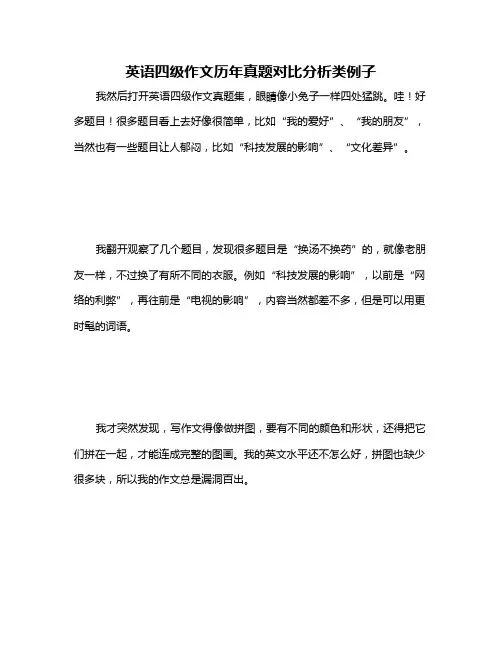
英语四级作文历年真题对比分析类例子我然后打开英语四级作文真题集,眼睛像小兔子一样四处猛跳。
哇!好多题目!很多题目看上去好像很简单,比如“我的爱好”、“我的朋友”,当然也有一些题目让人郁闷,比如“科技发展的影响”、“文化差异”。
我翻开观察了几个题目,发现很多题目是“换汤不换药”的,就像老朋友一样,不过换了有所不同的衣服。
例如“科技发展的影响”,以前是“网络的利弊”,再往前是“电视的影响”,内容当然都差不多,但是可以用更时髦的词语。
我才突然发现,写作文得像做拼图,要有不同的颜色和形状,还得把它们拼在一起,才能连成完整的图画。
我的英文水平还不怎么好,拼图也缺少很多块,所以我的作文总是漏洞百出。
我只能努力回想起老师讲过的单词和句型,就像在脑海里的抽屉里一样,想找到可以使用的材料。
有时候我能找到一些,却不知道怎么用,就像找到了一张拼图,却不知道该把它装在哪里。
真希望我能够像电影里的主人公一样,突然变得很厉害,写几句话就能换取高分。
只是可惜现实是,我只能诚心地练习,努力学习,一步一步地提高自己的水平。
望着这些五花八门的真题,我突然明白,写作文就像是在跟老师和判卷老师对话,我们要用最清晰的文字表达自己的想法,才能让对方理解我们的意思。
好在我现在还不太会写作文,但我相信,如果坚持两个月努力学习,我一定可以写出精彩的作文,让老师和改卷老师都眼前一亮!。
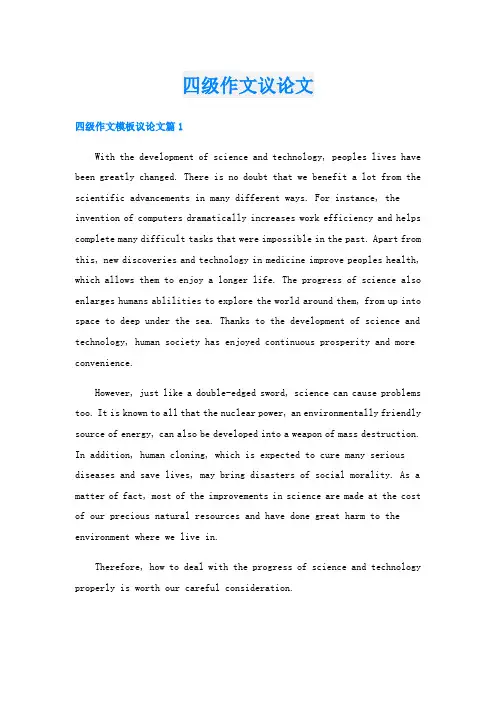
四级作文议论文四级作文模板议论文篇1With the development of science and technology, peoples lives have been greatly changed. There is no doubt that we benefit a lot from the scientific advancements in many different ways. For instance, the invention of computers dramatically increases work efficiency and helps complete many difficult tasks that were impossible in the past. Apart from this, new discoveries and technology in medicine improve peoples health, which allows them to enjoy a longer life. The progress of science also enlarges humans ablilities to explore the world around them, from up into space to deep under the sea. Thanks to the development of science and technology, human society has enjoyed continuous prosperity and more convenience.However, just like a double-edged sword, science can cause problems too. It is known to all that the nuclear power, an environmentally friendly source of energy, can also be developed into a weapon of mass destruction. In addition, human cloning, which is expected to cure many serious diseases and save lives, may bring disasters of social morality. As a matter of fact, most of the improvements in science are made at the cost of our precious natural resources and have done great harm to the environment where we live in.Therefore, how to deal with the progress of science and technology properly is worth our careful consideration.Nowadays,more and more hi-tech tools,such ascalculator,computer,etc,appear in our daily life.we use them wherever and whenever we are,so that our life becomes easier and more comfortable than before. However,does anyone think about what problems science and technology have caused to happen in this world?To some degree,its more serious than that we consider.We human indeed use them to improve our living standard,but on the other hand,we are becoming lazier,more reliable than we used to be.All day long those hi-tech products accompany us,then we have either no space or time to think,as well,communication between each other decreases,and what takes place of it is the huge indifference and gap among human. To solve these problems,we should in no time take measures to do with them.Firstly,communicate with others and think on your own more.Secondly,decrease the times you use hi-tech tools.For the advantages of technology,we should absorb,at the meantime,be independent and abandon the short-comings.Thus,we could combine technology and human progress much closer and not lose ourselves in this modern society.四级作文模板议论文篇2The rapid development of science and technology has brought about great changes to human life.The great benefits brought about by this progress is hailed in every corner of the world.New electronic appliances have made our life simpler than ever before.New inventions have helped us to organize our daily activities.Our job can be done faster.Mobiles and QQ have made it easier to communicate with other people.Internet has enabled us to know and understand other culture and society better.However,The disadvantages about this development should not be neglected .Some of scientific inventions have even caused great harms or disastersto mankind.For example,advanced technology can be easily manipulated by irresponsible persons.Besides,Well be too dependant on it.When technology fails,we are helplessSometimes,it affects our health and lifestyles(well be complacent and lazy.) The chemicals may be hazardous).Whats worse,Science and tecnology may even destroy our simple and healthy life(Sometimes How we miss the traditional style of living!).In addition ,The appearance of new technology may invade our privacy.To sum up,humans must be alert against the possible harm while enjoying the benefits from them.四级作文模板议论文篇3With the development of science and technology,peoples lives have been greatly changed.There is no doubt that we benefit a lot from the scientific advancements in many different ways.For instance,the invention of computers dramatically increases work efficiency and helps complete many difficult tasks that were impossible in the past.Apart from this,new discoveries and technology in medicine improve peoples health,which allows them to enjoy a longer life.The progress of science also enlarges humans ablilities to explore the world around them,from up into space to deep under the sea.Thanks to the development of science and technology,human society has enjoyed continuous prosperity and more convenience.However,just like a double-edged sword,science can cause problems too.It is known to all that the nuclear power,an environmentally friendly source of energy,can also be developed into a weapon of mass destruction.In addition,human cloning,which is expected to cure many serious diseases and save lives,may bring disasters of social morality.As a matter of fact,most of the improvements in science are made at the cost of our precious natural resources and have done great harm to the environment where we live in.Therefore,how to deal with the progress of science and technology properly is worth our careful consideration.。
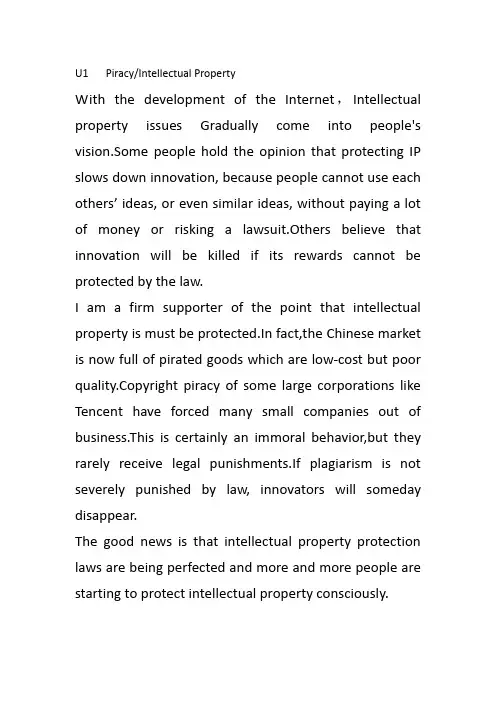
U1 Piracy/Intellectual PropertyWith the development of the Internet,Intellectual property issues Gradually come into people's vision.Some people hold the opinion that protecting IP slows down innovation, because people cannot use each others’ ideas, or even similar ideas, without paying a lot of money or risking a lawsuit.Others believe that innovation will be killed if its rewards cannot be protected by the law.I am a firm supporter of the point that intellectual property is must be protected.In fact,the Chinese market is now full of pirated goods which are low-cost but poor quality.Copyright piracy of some large corporations like Tencent have forced many small companies out of business.This is certainly an immoral behavior,but they rarely receive legal punishments.If plagiarism is not severely punished by law, innovators will someday disappear.The good news is that intellectual property protection laws are being perfected and more and more people are starting to protect intellectual property consciously.U8 GM FoodGenetically modified (GM) food is developed from specially modified seeds and animal embryo.Some people hold the opinion that the benefits of growing genetically modified plants are many while others have argued that the cross-species mixing of genes is unnatural and is likely to have harmful effects in the long term.In my opinion,in the long run, genetically modified food is more good than harm.Firstly, genetically modified plants have greater yields and then well-fed world population benefited from genetically modified crops would be a stable one and, therefore, less likely to start wars.GM crops seeds can be made resistant to diseases caused by bacteria, viruses and fungi. Also, because GM seeds grow into large and strong plants, they are better able to fight against extremes of climate. This means that GM crops do not need to be treated with chemicals while they are growing.In other words, genetically modified crops are environmentally friendly.But at the current scientific level,I think,We should still be cautious about eating genetically modified foods.U12 ExaminationExaminations are used by most educational systems which become a well-established means of measuring a person’s understanding of a subject.Some people think that exams can help us to identify the most able learners, and the existence of an examination at the end of a course may motivate learners to work hard while others believe that exams can cause excessive pressure on learners and cannot truly reflect a student's academic level.In my opinion,examinations are indispensable.A number of studies show that the existence of examinations encourages students to take their work seriously.Examinations are a reasonably reliable indicator of students’academic ability and allow employers and educational administrators to base their judgement on objective.Besides,many very important selection procedures rely on examination results.Society needs a standardized system of assessment for deciding who will continue on to education, and who will do particular jobs.But on the other hand, I think the form and content of examination is still need to be improved,and schools should aim at improving students' academic ability, not just for passing the exam.U13 Online RomanceWith the development of the Internet, more and more online dating APP and web appeared,providing young people with a new way to make friends and find lover.Some people are fond of internet dating because it narrows the distance between them and strangers , while others think internet romance is unreliable because it is far from the real life.In my opinion,online dating is reliable, as long as we protect ourselves online.Social software has many functions, many people post their photos, diaries, works on it.We can meet like-minded people from all over the world through the Internet.There are also some blind date software that allows people to choose the age, height, occupation of one's ideal other half and then the software will recommend the right person for he/her. To protect oneself ,The first is not to transfer money to netizen,and the second is not to meet netizen in reality if you don’t know him or her enough.I believe that as long as you keep these two points in mind, online romance is safe and reliable.。
对比类英语四级作文英文回答:In the tapestry of life, we encounter countless comparisons that shape our perspectives and inform our choices. One such comparison that has garnered significant attention is the contrasting relationship between individualism and collectivism. Individualism emphasizes the self, personal autonomy, and the pursuit of individual goals, while collectivism prioritizes the interests of the group, social harmony, and interdependence.Delving into the realm of cultural psychology, we observe striking differences between individualistic and collectivist societies. Individualistic cultures, such as those found in Western nations, value self-expression, independence, and personal achievement. Individuals are encouraged to stand out, assert their unique qualities, and strive for their own success. In contrast, collectivist cultures, prevalent in many Eastern societies, emphasizethe importance of the group and social harmony. Individuals are taught to respect authority, conform to social norms, and prioritize the welfare of the collective over their own personal desires.The impact of individualism and collectivism extendsfar beyond cultural norms; it shapes our social behaviors, values, and interpersonal relationships. In individualistic societies, individuals are expected to be self-reliant, competitive, and focused on their own accomplishments. They tend to value personal freedom, privacy, and the pursuit of their own interests. In collectivist societies, however, individuals are more likely to be interdependent, cooperative, and deferential to the group. They place ahigh value on family, community, and social belonging.The contrasting perspectives on individualism and collectivism also manifest in the way we approach work and leadership. In individualistic cultures, work is often seen as a means of personal advancement and financial gain. Individuals are motivated by personal ambition, competition, and the desire to achieve individual success. Incollectivist cultures, on the other hand, work is perceived as a way to contribute to the group's well-being.Individuals are motivated by a sense of shared responsibility, loyalty, and a desire to maintain social harmony.Similarly, leadership styles vary acrossindividualistic and collectivist societies. Inindividualistic cultures, leaders are expected to be charismatic, assertive, and independent decision-makers. They are often seen as the driving force behind organizational success or failure. In collectivist cultures, however, leadership is more likely to be shared among a group of individuals. Leaders are expected to be humble, consensus-oriented, and focused on fostering group cohesion.It is important to note that individualism and collectivism are not mutually exclusive concepts. Theyexist on a continuum, and many societies exhibit elementsof both. The balance between individualism and collectivism in a particular society is shaped by a complex interplay of historical, cultural, and social factors.In conclusion, the comparison between individualism and collectivism provides invaluable insights into the diverse ways in which human societies organize themselves and navigate the world. Both individualism and collectivism have their own strengths and weaknesses, and the optimal balance between the two likely varies depending on the context and circumstances. Understanding these contrasting perspectives can help us appreciate cultural differences, build bridges across cultural divides, and create more harmonious and inclusive societies.中文回答:个体主义与集体主义的对比。
4级作文类型和模板一、议论文1. 观点对比型(1)开头段:引出话题,表明存在两种不同的观点Nowadays, there is a widespread concern over the issue that [主题]. People's opinions vary greatly on this matter. Some people believe that [观点一], while others hold the opposite view that [观点二].(2)中间段:分别阐述两种观点的理由Those who support [观点一] clm that [理由一]. For example, [举例说明]. Moreover, [理由二].On the contrary, the advocates of [观点二] argue that [理由三]. They also point out that [理由四].In my opinion, both views have their merits. However, I prefer [你的观点] because [原因]. In conclusion, it is essential to strike a balance between [观点一] and [观点二] in order to [达到的效果].2. 问题解决型(1)开头段:描述问题In recent years, [问题] has bee an increasingly serious problem, which has aroused great concern among people.(2)中间段:分析问题产生的原因并提出解决措施There are several reasons accounting for this problem. Firstly, [原因一]. Secondly, [原因二]. Thirdly, [原因三].To solve this problem, several effective measures should be taken. Firstly, [措施一]. Secondly, [措施二]. Thirdly, [措施三].In conclusion, only taking these measures can we solve the problem successfully. I believe that with the joint efforts of the whole society, a better future awts us.二、说明文1. 现象解释型(1)开头段:引出要解释的现象Nowadays, [现象] has attracted much attention. It is a mon phenomenon that [具体描述现象].(2)中间段:解释现象产生的原因There are several factors contributing to this phenomenon. The mn reason is [原因一]. Another important factor is [原因二]. In addition, [原因三] also plays a role.To sum up, [现象] is the result of multiple factors. In order to deal with it, we should [建议]. Only in this way can we [期望的结果].2. 图表描述型(1)开头段:描述图表的主题和数据来源The chart/graph/table shows/illustrates the information about [主题] from [数据来源] during the period of [时间范围].(2)中间段:详细描述图表中的数据和趋势As can be seen from the chart/graph/table, [数据一] hasincreased/decreased significantly, while [数据二] has remned stable. Moreover, [数据三] shows a slight upward/downward trend.三、记叙文1. 个人经历型(1)开头段:引出经历One day/Last week/Recently, I had an unforgettable experience that I would like to share with you.(2)中间段:详细描述经历的过程It all started when [开始的情况]. Then, [发展过程]. Eventually, [结果]. During this experience, I felt [感受].2. 故事讲述型(1)开头段:设置背景,引出故事Long ago/In a small town/Once upon a time, there was a [人物/地点/事件].(2)中间段:按照时间顺序或情节发展讲述故事At first, [情节一]. Then, [情节二]. After that, [情节三]. Finally, [结局].This story tells us that [寓意或启示]. We should learn from [人物的品质或行为] and avoid making the same mistakes.。
英语四级对比观点类写作对比观点题型的议论文写作也是英语四级写作考察的重点之一,下面,店铺为大家送上一些英语四级对比观点类写作模板,祝大家考试顺利。
英语四级对比观点类写作模板一(1) 要求论述两个对立的观点并给出自己的看法。
1. 有一些人认为。
2. 另一些人认为。
3. 我的看法。
The topic of ①-----------------(主题)is becoming more and more popular recently. There are two sides of opinions of it. Some people say A is their favorite. They hold their view for the reason of ②-----------------(支持A的理由一)What is more, ③-------------理由二). Moreover, ④---------------(理由三).While others think that B is a better choice in the following three reasons. Firstly,-----------------(支持B的理由一). Secondly (besides),⑥------------------(理由二). Thirdly (finally),⑦------------------(理由三).From my point of view, I think ⑧----------------(我的观点). The reason is that ⑨--------------------(原因). As a matter of fact, there are some other reasons to explain my choice. For me, the former is surely a wise choice .英语四级对比观点类写作模板二(2) 给出一个观点,要求考生反对这一观点Some people believe that ①----------------(观点一). For e xample, they think ②-----------------(举例说明).And it will bring them ③-----------------(为他们带来的'好处).In my opinion, I never think this reason can be the point. For one thing,④-------------(我不同意该看法的理由一). For anotherthing, ⑤-----------------(反对的理由之二).Form all what I have said, I agree to the thought that ⑥------------------(我对文章所讨论主题的看法).英语四级对比观点类写作模板三(3) 不同观点列举型( 选择型 )There is a widespread concern over the issue that __作文题目_____. But it is well known that the opinion concerning this hot topic varies from person to person. A majority of people think that _ 观点一________. In their views there are 2 factors contributing to this attitude as follows: in the first place, ___原因一_______.Furthermore, in the second place, ___原因二_____. So it goes without saying that ___观点一_____.People, however, differ in their opinions on this matter. Some people hold the idea that ___观点二_______. In their point of view, on the one hand, ___原因一_______. On the other hand, ____原因二_____. Therefore, there is no doubt that ___观点二______.As far as I am concerned, I firmly support the view that __观点一或二______. It is not only because ________, but also because _________. The more _______, the more ________.【英语四级对比观点类写作模板】。
U1 Piracy/Intellectual PropertyWith the development of the Internet,Intellectual property issues Gradually come into people's vision.Some people hold the opinion that protecting IP slows down innovation, because people cannot use each others’ ideas, or even similar ideas, without paying a lot of money or risking a lawsuit.Others believe that innovation will be killed if its rewards cannot be protected by the law.I am a firm supporter of the point that intellectual property is must be protected.In fact,the Chinese market is now full of pirated goods which are low-cost but poor quality.Copyright piracy of some large corporations like Tencent have forced many small companies out of business.This is certainly an immoral behavior,but they rarely receive legal punishments.If plagiarism is not severely punished by law, innovators will someday disappear.The good news is that intellectual property protection laws are being perfected and more and more people are starting to protect intellectual property consciously.U8 GM FoodGenetically modified (GM) food is developed from specially modified seeds and animal embryo.Some people hold the opinion that the benefits of growing genetically modified plants are many while others have argued that the cross-species mixing of genes is unnatural and is likely to have harmful effects in the long term.In my opinion,in the long run, genetically modified food is more good than harm.Firstly, genetically modified plants have greater yields and then well-fed world population benefited from genetically modified crops would be a stable one and, therefore, less likely to start wars.GM crops seeds can be made resistant to diseases caused by bacteria, viruses and fungi. Also, because GM seeds grow into large and strong plants, they are better able to fight against extremes of climate. This means that GM crops do not need to be treated with chemicals while they are growing.In other words, genetically modified crops are environmentally friendly.But at the current scientific level,I think,We should still be cautious about eating genetically modified foods.U12 ExaminationExaminations are used by most educational systems which become a well-established means of measuring a person’s understanding of a subject.Some people think that exams can help us to identify the most able learners, and the existence of an examination at the end of a course may motivate learners to work hard while others believe that exams can cause excessive pressure on learners and cannot truly reflect a student's academic level.In my opinion,examinations are indispensable.A number of studies show that the existence of examinations encourages students to take their work seriously.Examinations are a reasonably reliable indicator of students’academic ability and allow employers and educational administrators to base their judgement on objective.Besides,many very important selection procedures rely on examination results.Society needs a standardized system of assessment for deciding who will continue on to education, and who will do particular jobs.But on the other hand, I think the form and content of examination is still need to be improved,and schools should aim at improving students' academic ability, not just for passing the exam.U13 Online RomanceWith the development of the Internet, more and more online dating APP and web appeared,providing young people with a new way to make friends and find lover.Some people are fond of internet dating because it narrows the distance between them and strangers , while others think internet romance is unreliable because it is far from the real life.In my opinion,online dating is reliable, as long as we protect ourselves online.Social software has many functions, many people post their photos, diaries, works on it.We can meet like-minded people from all over the world through the Internet.There are also some blind date software that allows people to choose the age, height, occupation of one's ideal other half and then the software will recommend the right person for he/her. To protect oneself ,The first is not to transfer money to netizen,and the second is not to meet netizen in reality if you don’t know him or her enough.I believe that as long as you keep these two points in mind, online romance is safe and reliable.。
英语大学四级考试中的选择类论述文的范文The CET-4 (College English Test Level 4) is an important English proficiency exam for college students in China. It is designed to test students' listening, reading, writing, and translation skills in order to assess their English language proficiency. Among the different types of questions on the CET-4 exam, the multiple-choice questions are particularly challenging as they require students to not only understand the content of the passage but also to analyze and discern the correct answer choice among several options.In the listening section of the CET-4 exam, students are required to listen to a passage and answer multiple-choice questions based on the information they hear. This section tests students' ability to comprehend spoken English and to extract key information from the audio. It also assesses their listening skills, such as identifying main ideas, supporting details, and inferences. Additionally, the listening section helps students improve their listening comprehension, ability to follow instructions, and vocabulary acquisition.In the reading section of the CET-4 exam, students are given a passage to read and must answer multiple-choice questions based on the text. This section evaluates students' readingcomprehension skills, including their ability to understand the main ideas, supporting details, and organizational structure of the passage. It also tests their ability to make inferences, draw conclusions, and analyze the author's purpose and tone. By answering multiple-choice questions in the reading section, students can enhance their reading skills, vocabulary knowledge, and critical thinking abilities.In the writing section of the CET-4 exam, students are required to write a short essay or composition in response to a given prompt. While this section does not containmultiple-choice questions, it is essential for students to understand how to structure their writing effectively, use appropriate vocabulary and grammar, and express their ideas clearly and cohesively. By practicing writing essays and compositions, students can improve their writing skills, enhance their ability to communicate effectively in written English, and develop their creativity and critical thinking skills.In the translation section of the CET-4 exam, students are asked to translate a passage from Chinese to English or vice versa. This section tests students' translation skills, including their ability to understand and interpret the meaning of the original text, and to express it accurately and fluently in thetarget language. By practicing translation exercises, students can improve their language proficiency, develop their translation skills, and enhance their vocabulary and grammar knowledge.Overall, the multiple-choice questions in the CET-4 exam are an essential component of the test that evaluates students' English language proficiency and skills in listening, reading, writing, and translation. By mastering the techniques for answering multiple-choice questions, students can improve their test-taking strategies, enhance their language abilities, and achieve success on the CET-4 exam. Through diligent practice and preparation, students can overcome the challenges of multiple-choice questions and perform well on the exam, demonstrating their proficiency in English and their readiness for academic and professional endeavors.。
大学英语四级写作备考四大步骤根据多年的教学经验,四级写作备考可分为四大步骤:一、背诵:首先认真研究历年四级写作真题,重点研究2003年6月—2008年12月的真题,分析近年来四级写作的出题规律和考试重点,从语言、结构、内容三大层面,认真研读经典写作真题范文:语言方面学习范文中的精彩词汇、词组、句型;结构方面学习范文的框架结构、内在逻辑、关联词、同义替换和代词替换;内容方面学习范文的论点、论据和论证。
同时背诵精彩写作范文,要求滚瓜烂熟、脱口而出、多多益善,扎扎实实提高自己的写作实力。
二、默写:背诵熟练之后默写下来,仔细对照原文,会发现你默写的文章与原文有一些语法、拼写、标点的区别,这些区别就是你的写作弱点,学习关键在于针锋突破,不要全面出击。
这些弱点正是你在考试中扣分的原因所在,把这些弱点意义克服,分数自然就会提高。
三、中译英:首先将写作真题范文译为中文,或参考范文的正确译文,然后进行中译英的工作,根据自己的理解把中文译为英文,最后对照英文原文,你会发现你的译文与原文存在较大的差别,这些差别正是你写作低分的症结所在。
同样的一个中文句子,仔细对比一下你使用了哪些词汇、词组和句型,原文使用了哪些,这样你的写作水平才会逐渐提高。
四、写作:进行完上述工作之后,在考前必须进行写作的工作,只有动笔写作,才会发现自己的问题。
可以写5—10篇真题或模拟题,模仿自己曾经背诵过的精彩词汇、词组、句型、框架和范文,写出一篇新的文章。
最初不要求速度,但考前一定要进行模考,半小时写出一篇120-150词的文章。
写完之后仔细修改其中的语言错误,将其改的更加精彩。
英语写作基础不太好的四级考生,必须按照上述步骤严格进行;基础较好的考生学习顺序正好相反,首先写作,直接写作四级真题;其次中译英,在研读原文之前,进行中译英的工作,译完对比,找出差距;然后背诵;最后默写。
同时可以准备自己的写作框架,应用文和论说文分别形成固定的写法,积累精彩句型。
多读、多写、多改,写作高分不是梦!CET-4写作强化套用经典句型(按作文类型及谋篇分类)Unit 2第一段:展现问题、现象,从而引出人们所持的不同观点问题的常用词:question, problem, issue(一)展现问题Along with the advance of the society more and more problems are brought to our attention, one of which is that....随着社会的不断发展,出现了越来越多的问题,其中之一便是____________。
As to whether it is a blessing or a curse, however, people take different attitudes。
然而,对于此类问题,人们持不同的看法。
(Hold different attitudes 持不同的看;Come up with different attitudes 有不同的看法)As society develops, people are attaching much importance to....随着社会的发展,人们开始关注............As to whether it is worthwhile ....., there is a long-running controversial debate. It is quite natural that people from different backgrounds may have divergent attitudes towards it.关于是否值得___________的问题,一直以来争论不休。
当然,不同的人对此可能持不同的观点。
Recently, the issue of ...... has been brought into public focus/concern.近来,_______的问题引起了社会的广泛关注。
Now we are entering a brand new era full of opportunities and innovations, and great changes have taken place in people's attitude towards some traditional practice.现在我们进入了一个充满机遇和创新的崭新时代,很多人对某些传统的看法也发生了很大改变。
Recently the issue of whether or not ... has been in the limelight and has arousedwide concern in the public.近来,是否_______的问题已经非常明确而且引起了社会的广泛关注。
(二)引出不同观点People's views on... vary from person to person. Some hold that... . However, o thers believe that....人们对...的观点因人而异.有些人认为.....然而其他人却认为...People may have different opinions on...人们对...可能会有不同的见解。
Attitudes towards (drugs) vary from person to person.人们对待吸毒的态度因人而异。
There are different opinions among people as to...关于.... 人们的观点大不相同。
Different people hold different attitudes toward (failure).对(失败)人们的态度各不相同。
Recently the phenomenon has aroused wide concern, some people are in alarm that....最近,这种现象引起了人们的广泛关注,有人开始担心______________。
The human race has entered a completely new stage in its history, with the increasingly rapid economic globalization and urbanization, more problems are brought to our attention. 人类进入了一个历史的崭新的阶段,经济全球化、都市化的速度不断加快,随之给我们带来了很多问题。
At present, some people think ....while othersclaim ...Both sides have their merits.目前,一些人认为_______而另一些人则认为_______。
其实,两种观点都其可取之处。
People rarely reach an absolute consensus on such a controversial issue.对于这种极具争议的话题,我们很难作出绝对的回答。
People from different backgrounds would put different interpretations on the same case.不同行业的人对同一种问题的解释不尽相同。
The controversial issue is often brought into public focus. People from different backgrounds hold different attitudes towards the issue.这中极具争议性的话题往往很受社会的关注。
不同的人对此问题的看法也不尽相同。
When asked ..., some people think..... while some prefer...说到______,有人认为________,而另一些人则认为__________。
Just as the saying goes: "so many people, so many minds". It is quite understandable that views on this issue vary from person to person.俗话说,""。
不同的人对此有不同的看法是可以理解的。
To this issue, different people come up with various attitudes.对于这个问题,不同的人持不同的观点。
When it comes to ..., most people believe that ..., but other people regard ...as ....提到_________问题,很多人认为_________,不过,一些人则认为______是____.When faced with...., quite a few people claimthat ...., but other people think as...提到_________问题,仅少数人认为________,但另一些人则认为_________。
There is a public controversy nowadays over the issue of .... There who criticize ...argue that ...., they believe that ...,but people who favor .., on the other hand, argue that...目前,_______问题争议较大。
批判_______的人认为_______,他们认为_______,不过,另一方面,赞同_______的人则认为_________。
第二段:再次阐述对立观点一并分析原因(一)再次阐述对立观点一Some people are of the opinion that..有些人认为_____________。
Many/A majority of/ A large number of people claim that...很多/绝大多数人认为_____________。
Some people contendthat ... has proved to bringmany advantages (disadvantages)有些人认为________有很多有利之处(不利之处)。